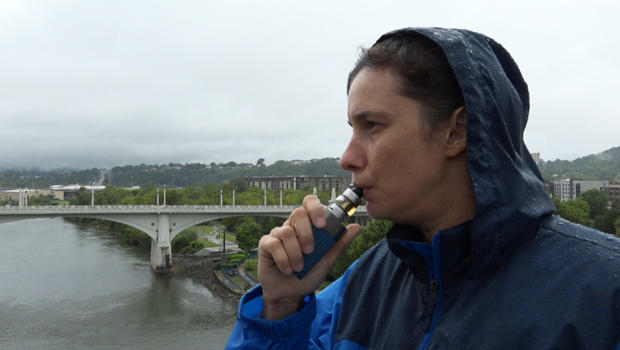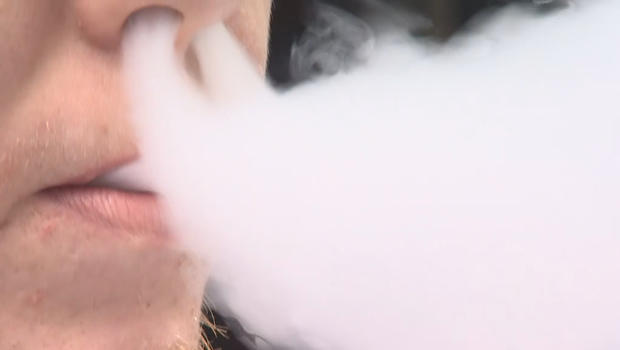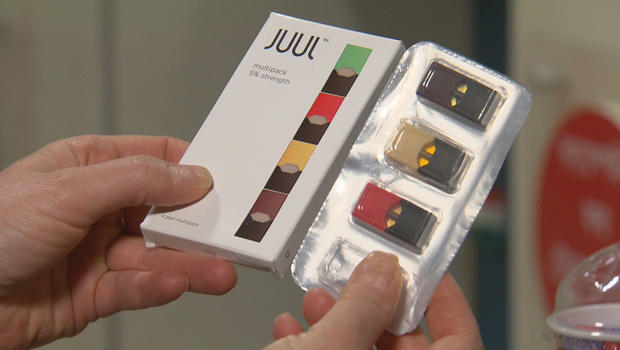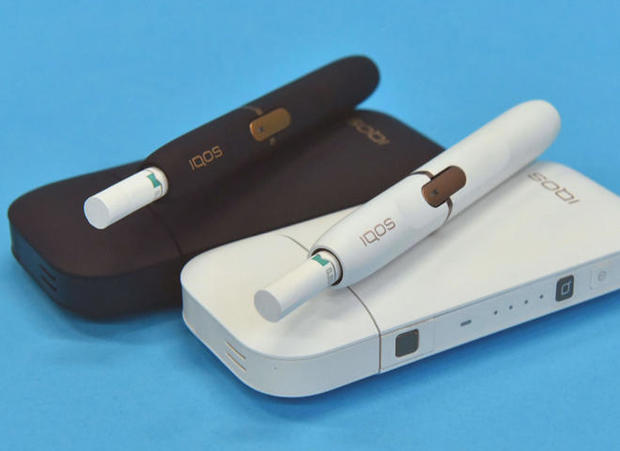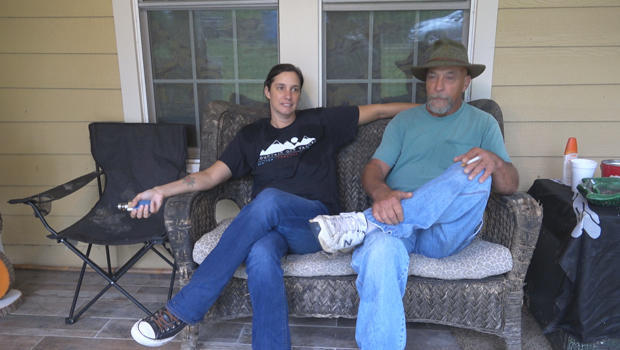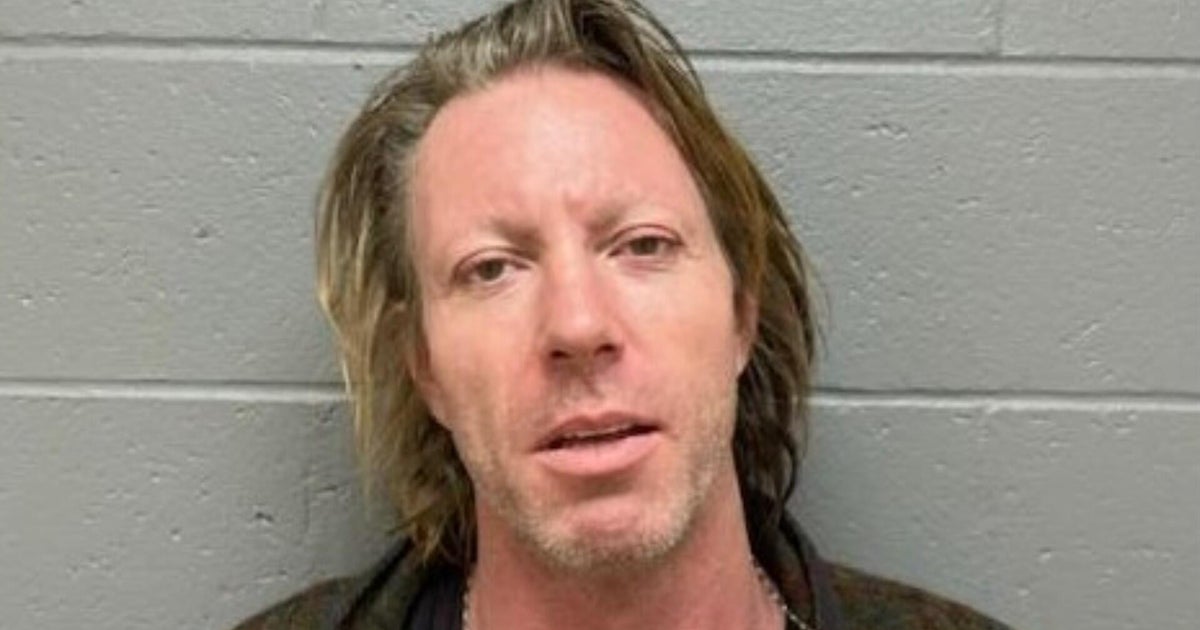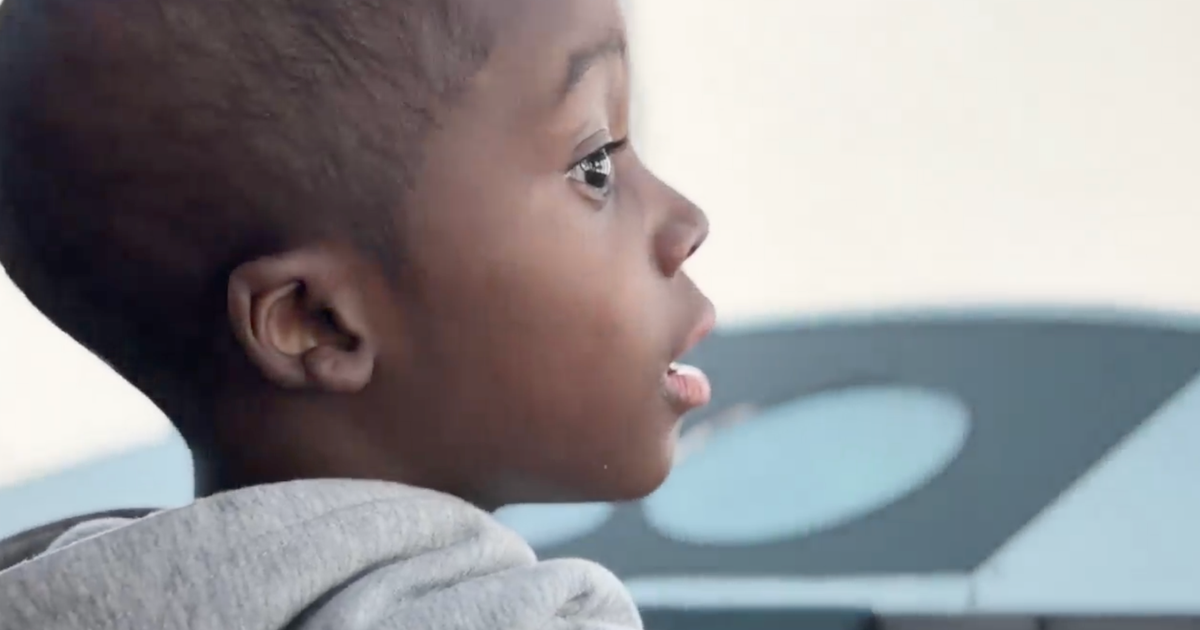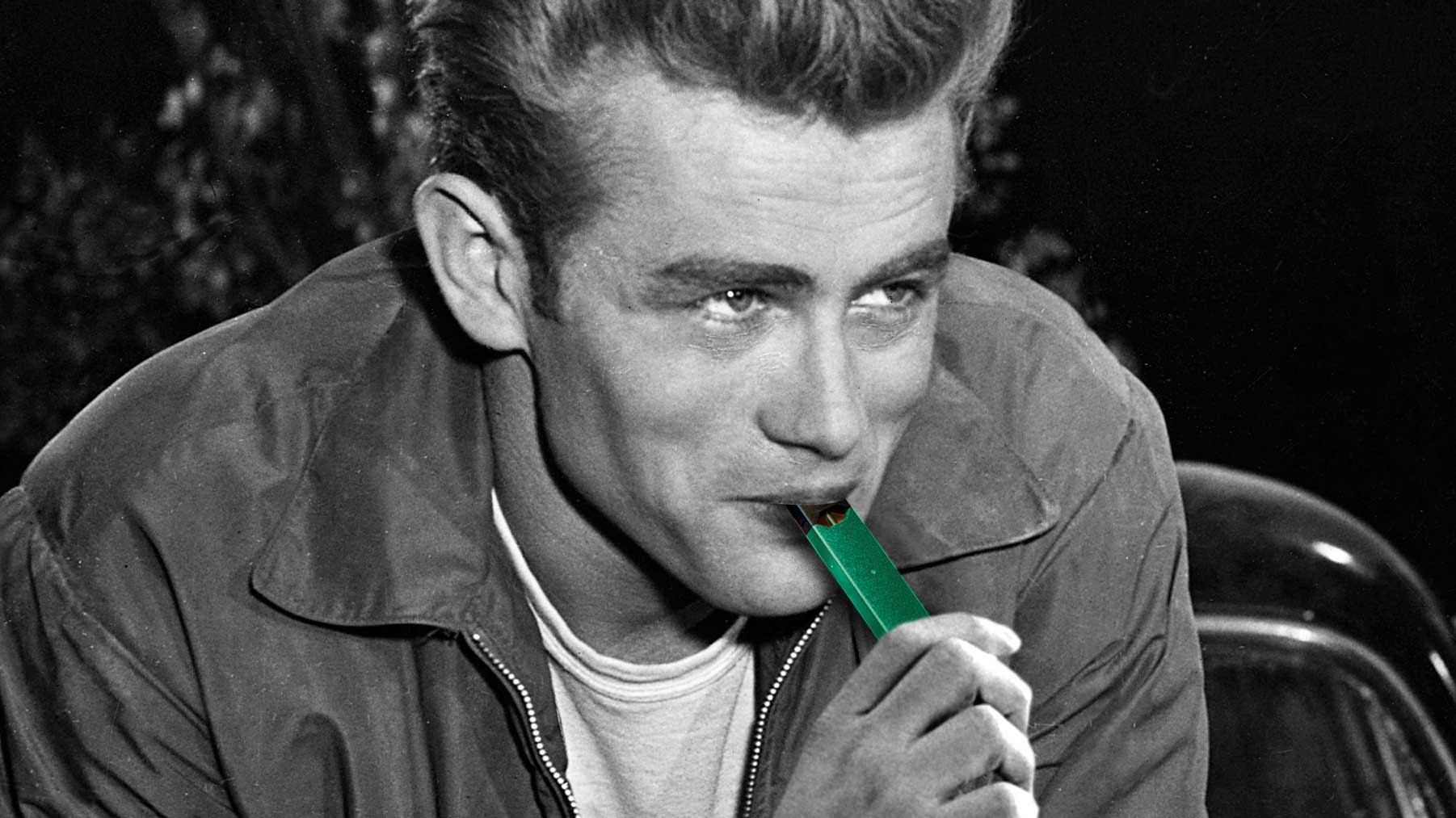Clearing the air: Controversy and cautious hope over vaping
Nicole Crumley grew up in tobacco country, and tried her first cigarette when she was barely out of middle school. "It's kind of what you did in the South, when you're 13 years old. I think things are a little different down here," she told correspondent Tony Dokoupil. For the next 20 years, she couldn't kick the habit: "I tried the gum, I tried the patches, I've tried the lozenges, and none of that stuff worked." What ultimately did work is vaping.
Crumley uses an e-cigarette, or vaporizer – an electronic device that heats what's called an "e-liquid" containing nicotine, but producing vapor, not smoke.
"I immediately realized I was feeling better," Crumley said. "I could breathe better. It doesn't take long for your lungs to kind of heal themselves."
Dokoupil asked, "Did you feel like there were changes going in your lungs?"
"I did," she replied. "I wasn't coughing when I woke up in the morning any more. That was a big thing. I think a lot of smokers go through that: They cough as soon as they wake up. I wasn't doing that any more, and I haven't done that since."
Crumley is now hoping to share that feeling and, she's convinced, help save lives, as a volunteer for an advocacy group called the Tennessee Smoke-Free Association.
But e-cigarettes are winning over more than just former smokers. In fact, they are gaining cautious support from a growing number of public health experts. In June no less than the American Cancer Society noted that while the long-term effects of e-cigarettes are "not known," they are "markedly less harmful" than traditional smoking.
If you're still skeptical, well, there's good reason: for decades tobacco companies used misleading science to sell cigarettes and smoking first as safe, and then as safer.
But Dr. Scott Gottlieb, Commissioner of the U.S. Food and Drug Administration, believes this time really could be different. Last year he proposed a historic plan to help save the lives of America's 38 million smokers. It involves reducing the amount of nicotine in cigarettes, and encouraging committed smokers to become "vapers" instead.
He claims that if every smoker today switched to an e-cigarette, America would be safer. "The hope is that you can wean smokers off of tobacco altogether, and off of nicotine altogether," said Dr. Gottlieb. "But for a component of smokers, if we can migrate them onto less harmful products, noncombustible products, the presumption is you're going to be reducing risk in an adult population."
"So, nicotine, to be clear, is not a cause of cancer?" asked Dokoupil.
"Nicotine's not. It's all the components of combustion. Nicotine's not a completely benign compound – it has side effects. But the cause of cancer, and the carcinogens in tobacco, are the products of the combustion."
In other words, it's not the nicotine that will kill you, it's the smoke. But Gottlieb and others are quick to point out that what may be a helpful for adults looking to quit is also enticing to teenagers.
Dokoupil asked, "How do you balance the interests of adult smokers with the risks associated with teen use? "
"Well, this is the challenge that we have," said Dr. Gottlieb. "You're hooking a generation of young people on nicotine. And some of those youth will become long-term users of nicotine, and maybe long-term users of e-cigarettes."
Ashley Gould, chief administrative officer for Juul, a California startup which makes the single bestselling e-cigarette in America – and whose marketing practices are under investigation by the FDA – told Dokoupil, "I just want to be crystal clear about this: We do not want a single teen using this product."
"E-cigarettes are now more popular among young people than traditional cigarettes. Is Juul the reason?"
"I have no idea."
The device is a sleek rectangle, paired with colorful nicotine cartridges as potent as a pack of cigarettes, and sweetened with flavors like mint, mango and fruit medley.
Dokoupil asked, "So, people look at your early marketing and they conclude, 'How could they not know this was going to be attractive to young people?' Bright colors, cool flavors, cool people. Seems obvious."
"It was an incredibly short-lived campaign and if we had it over to do again, we would not do it that way," Gould said.
"It's an error?"
"It was not done in a way that it helped us achieve our mission."
That mission, according to Juul co-founder James Monsees, is to give smokers everything they like about the ritual of smoking without the dangers.
Dokoupil asked, "Not so long ago at the beginning of the Juul phenomenon, you gave a talk where you said that there was something beautiful and wondrous about the ritual of smoking. Do you think in creating Juul, you've created something equally beautiful and wonderful?"
"Yeah, I think so," Monsees replied. "I hear that quite a bit. I think one of the most wonderful parts of the design for consumers is that, you know, they've finally been able to free themselves from cigarettes. But you know, I think what it takes is an equally beautiful experience."
But a key part of that experience is under threat. This summer Juul watched as all flavored tobacco was banned in the company's hometown of San Francisco. Other cities are now considering similar restrictions, fearing that flavors attract young people.
- E-cigarettes may be a gateway to smoking for teens, researchers say (CBS News, 01/02/18)
- FDA calls teen vaping an "epidemic," threatens to pull products off the market (CBS News, 09/12/18)
Malia Cohen, president of San Francisco's Board of Supervisors, led the campaign to ban flavored tobacco in the city.
"I got a lot of hate mail about this," she said. "The tagline was #adultsloveflavorstoo or something like that," she laughed. "And you know what? What brings me to the table is less concern for adults, but really focusing on children.
"What I've learned, not only in the tobacco industry but also taking on the sugary beverage industry, is that they also falsify data. And so that's what's most alarming. If the FDA's going to really be studying this, I want independent, pure, empirical research and data to drive this policy conversation."
For Cohen, this policy fight is also personal. "My grandparents died of smoking-related diseases. And I remember after I finished college I lived with my grandmother, so I'm in my early 20s, and I would go buy her cigarettes for her."
Cohen argues that e-cigarette makers are nothing but old-school Big Tobacco companies with a Silicon Valley face.
But walk into a vape shop anywhere in the country, and you see another side of the industry. About half of the vape market is still made up of small businesses mostly staffed and owned by former smokers like Steve Nair and his wife, Brandy.
The Nairs are co-owners of Mountain Oak Vapors, a small chain that sells vaporizers, and manufactures its own e-liquid.
"It's much cleaner than a tobacco factory," said Brandy.
"They call us a tobacco product for purposes of regulation," said Steve. "We're not really too connected to tobacco in the traditional sense. You don't see any tobacco around here."
He showed Dokoupil the process of manufacturing e-liquid. He says the liquid that most people vape is a mix of propylene glycol, nicotine, and flavors: "All kinds of different flavors from the fruits, bananas, peaches, mangoes, melons, pineapples."
"It's okay to touch it?"
"Yeah, yeah. It's just a food flavoring you would use in bakery or candy making at home."
"If the FDA concludes that flavors cause kids to start vaping and they restrict flavors or even ban flavors, that would mean this shelf, this shelf, gone."
"Well, that would mean our business would be gone," said Steve. "We're based on flavored products. Vaping as an industry really revolves around flavored products. We would not be able to compete very successfully with the cigarette if we didn't have these flavors."
Keep in mind, the potential end of the vapor industry could drive more people to smoke. But legacy cigarette companies aren't betting on it. They, too, see e-cigarettes as the future.
Andre Calantzopoulus is CEO of Philip Morris International. He told Dokoupil he imagines a future where Philip Morris is no longer selling cigarettes: "Yes, that will be the future. And the faster, the better."
Philip Morris, which last year manufactured some 800 billion cigarettes, is also the maker of Iqos, a new device that the company says could make the cigarette obsolete.
Dokoupil asked, "Can you say with confidence that if you smoke Iqos, you're less likely to get lung disease?"
"Yes, I can say that."
"Less likely to get cancer? Heart disease?"
"Yes. All the diseases."
Iqos heats real tobacco leaves producing an aerosol that Philip Morris International says is less harmful than smoke. The company has asked the FDA for permission to sell it in the U.S.
Dokoupil asked Calantzopoulos, "How, after years of acknowledged deception on the part of the tobacco industry, do you convince not only regulators but the public to trust you this time when you say [e-cigarettes are] better?"
"Look, it's very nice to say, 'Philip Morris, you can't believe them today because you couldn't believe them yesterday,' and so on. But do we think any smoker will move out of cigarettes with that? No. The world is changing."
The FDA is still reviewing Iqos, and figuring out how to regulate the entire world of smoke-free tobacco products, a process that is expected to take years.
People like Nicole Crumley, though, aren't waiting. She's now trying to convince her father – a smoker for 40 years – to try vaping ("It's not for me," he laughed), while also enjoying what she says are the benefits of a smoke-free life.
Crumley said, "I wish I had never started smoking to begin with."
Dokoupil asked, "How's your health?"
"My health is improved. I actually went to Colorado last month. And, you know, the elevation is a little different up there, and I actually did a hike and I wasn't winded. And I was like, man! There was no way I could have done this before!"
For more info:
- Tennessee Smoke-Free Association
- Consumer Advocates for Smoke Free Alternatives Association
- Electronic cigarettes: What's the bottom line? (CDC)
- American Cancer Society statement on Electronic Nicotine Delivery Systems
- Juul
- Iqos (Philip Morris)
- Mountain Oak Vapors
- Malia Cohen, president, San Francisco Board of Supervisors
- Dr. Scott Gottlieb, Commissioner, FDA
- Protecting American Families: Comprehensive Approach to Nicotine and Tobacco (Scott Gottlieb, M.D./FDA)
- FDA announces comprehensive regulatory plan to shift trajectory of tobacco-related disease, death (FDA)
- Efforts to reduce tobacco use (Scott Gottlieb, M.D./FDA)
- Stanford University Research Into the Impact of Tobacco Advertising
Story produced by Anthony Laudato.
